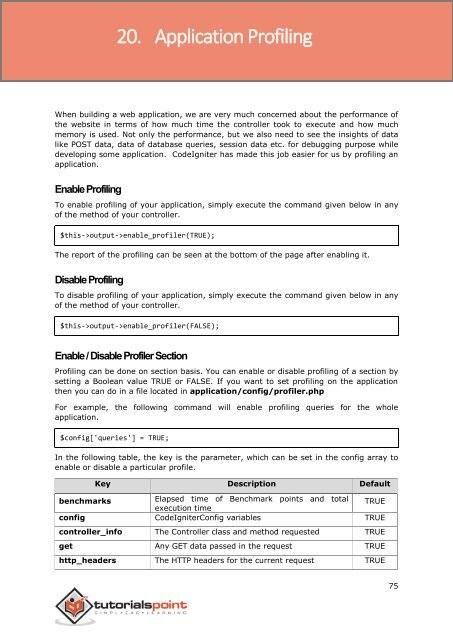codeigniter_tutorial
You also want an ePaper? Increase the reach of your titles
YUMPU automatically turns print PDFs into web optimized ePapers that Google loves.
20. Application Profiling<br />
CodeIgniter<br />
When building a web application, we are very much concerned about the performance of<br />
the website in terms of how much time the controller took to execute and how much<br />
memory is used. Not only the performance, but we also need to see the insights of data<br />
like POST data, data of database queries, session data etc. for debugging purpose while<br />
developing some application. CodeIgniter has made this job easier for us by profiling an<br />
application.<br />
Enable Profiling<br />
To enable profiling of your application, simply execute the command given below in any<br />
of the method of your controller.<br />
$this->output->enable_profiler(TRUE);<br />
The report of the profiling can be seen at the bottom of the page after enabling it.<br />
Disable Profiling<br />
To disable profiling of your application, simply execute the command given below in any<br />
of the method of your controller.<br />
$this->output->enable_profiler(FALSE);<br />
Enable / Disable Profiler Section<br />
Profiling can be done on section basis. You can enable or disable profiling of a section by<br />
setting a Boolean value TRUE or FALSE. If you want to set profiling on the application<br />
then you can do in a file located in application/config/profiler.php<br />
For example, the following command will enable profiling queries for the whole<br />
application.<br />
$config['queries'] = TRUE;<br />
In the following table, the key is the parameter, which can be set in the config array to<br />
enable or disable a particular profile.<br />
Key Description Default<br />
benchmarks<br />
Elapsed time of Benchmark points and total TRUE<br />
execution time<br />
config CodeIgniterConfig variables TRUE<br />
controller_info The Controller class and method requested TRUE<br />
get Any GET data passed in the request TRUE<br />
http_headers The HTTP headers for the current request TRUE<br />
75




